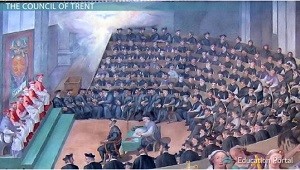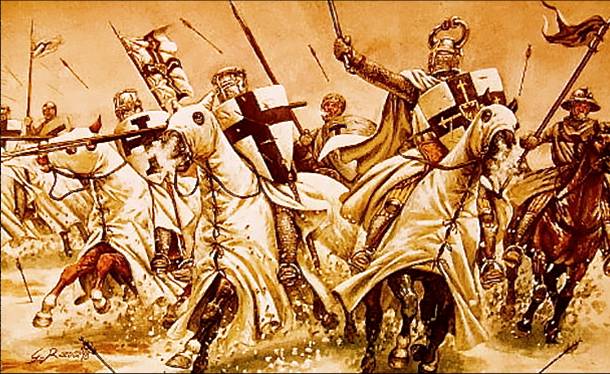Conversion of Constantine
Conversion Experience
Conversion of Constantine: There are moments in time that have changed the world, standing out as turning points in history. For the United States, there’s Lexington’s shot heard ’round the world; for Europe, the crowning of Charlemagne as Holy Roman Emperor. Although these events shaped continents, many historians give them a back seat to the conversion of Constantine, an event which elevated Christianity to political prominence and power. Ironically, such a profound event is believed to have begun with a vision and a dream.
To explain, tradition holds that Constantine converted to Christianity after an odd experience in the 312 CE battle of Milvian Bridge. While warring against Maxentius, his co-heir, Constantine began praying for assistance. In the midst of such prayer, he saw a beaming cross bearing the words: in hoc signo vinces (translated ‘by this sign you will conquer’). When he had a dream that very night in which God reaffirmed this vision, Constantine was sold.
| After having his vision reaffirmed in a dream, Constantine was converted. |
Now, whether Constantine’s conversion was heartfelt or whether he used his new found faith as an exaggerated good luck charm is still fodder for great debate among historians and theologians. However, everyone agrees on one point. Constantine’s conversion caused the political ascent of Christianity.
Legalization and Legislation
For starters, Constantine wasted little time promoting his new found faith. In 313, his reign saw the issue of the Edict of Milan, which legalized Christianity and freed its followers from the vicious, state-instituted persecutions experienced under emperors like Nero and Diocletian.
Not content with merely legalizing Christianity, Constantine had no problems mixing church and state. In fact, the integration of church and state is often referred to as Constantinism. In other words, he enacted legislation that acted like fertilizer for the faith. He declared Sunday as an official Roman holiday, making getting to church much easier for his subjects. He also offered tax exemption to the church and many of its clergy. Adding to this, Constantine changed December 25th from a celebration of a pagan God to a celebration of Christ’s birth, giving Christianity and kids all over the world Christmas!
Corruption
It must be mentioned that although these things definitely aided the ascent of Christianity, many historians also credit them with its corruption. Seeing the favor Constantine bestowed on the church and its members, it’s believed many flocked to the faith for political gain and personal advancement. Yes, their hearts may have been a bit tugged but their pocketbooks were downright sucked in.
This trend only increased as Constantine became more and more intolerant of the pagan faiths throughout his reign. Anyone wanting to climb the social ladder would have been a fool not to convert.
Nicaea and the Bible
Perhaps the most well-known and lasting piece of Constantine’s political portfolio is the 325 Council of Nicaea, a gathering of about 300 bishops issuing an official statement affirming Jesus Christ as completely divine. This statement of faith is known as the precursor to today’s still famous Nicene Creed. Without a doubt, Constantine put his political weight behind this creed, and the world still feels his influence. For instance, I live in a rather small town, but I wouldn’t have to go very far on a Sunday morning before I’d run into a Christian church displaying the Nicene Creed or quoting it as a congregation.
 |
| The Council of Nicaea affirmed Jesus Christ as divine, leading to the Nicene Creed. |
Constantine also played a role in validating the Bible. Wanting Christendom to rally around the sacred texts, he led the Council of Nicaea to begin the process of formal acceptance, or canonization, of scripture. Since the word canon actually means measuring stick, this was an official proclamation saying these books measure up! They are inspired by God.
In short, Constantine and the Council sort of put their rubber stamp of agreement onto the words actually found in 2 Timothy of the Bible itself, which reads, ‘All Scripture is God-breathed and is useful for teaching, rebuking, correcting and training in righteousness, so that the servant of God may be thoroughly equipped for every good work’ (2 Timothy 3:16-17).
Lesson Summary
The conversion of Constantine is an event that elevated Christianity to political prominence and power. Although it began with a vision, Constantine’s faith permeated his reign. Flying directly in the face of the modern separation of church and state, Constantine integrated the Christian faith into the political arena. Today, this integration is even given the name Constantinism.
Not merely content with his personal conviction, Constantine’s reign saw the legalization of Christianity through the Edict of Milan. It also saw the establishment of Sunday as a Roman holiday and December 25th as the official celebration of Christ’s birth.
Adding to this most impressive list, Constantine also called and presided over the famous Council of Nicea, which officially proclaimed Jesus Christ as divine and led to Christian church-goers all over the world quoting the Nicene Creed.
Source: https://study.com/academy/lesson/the-conversion-of-constantine-and-the-ascent-of-christianity.html



